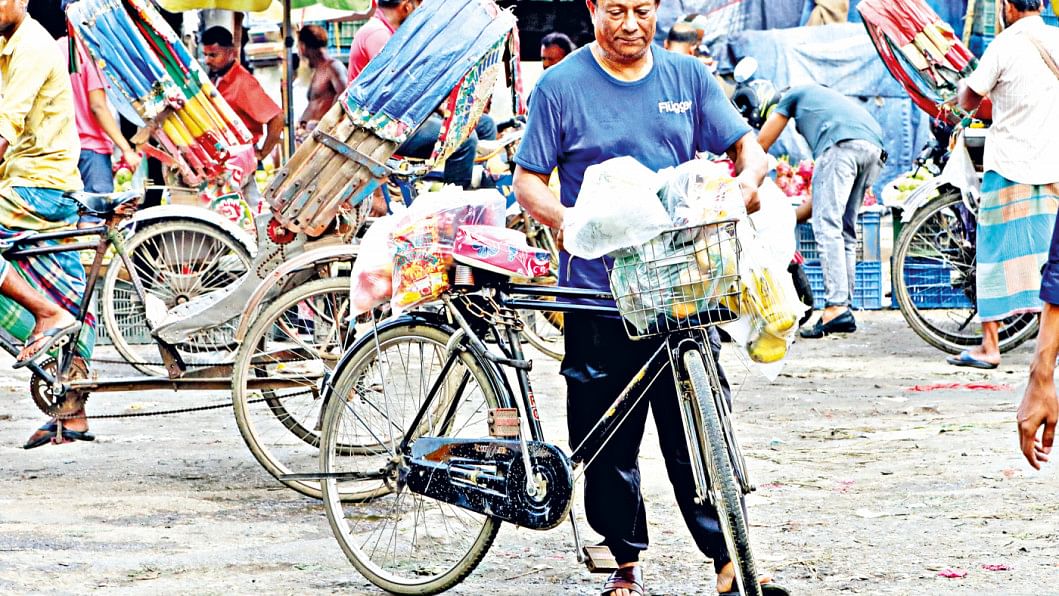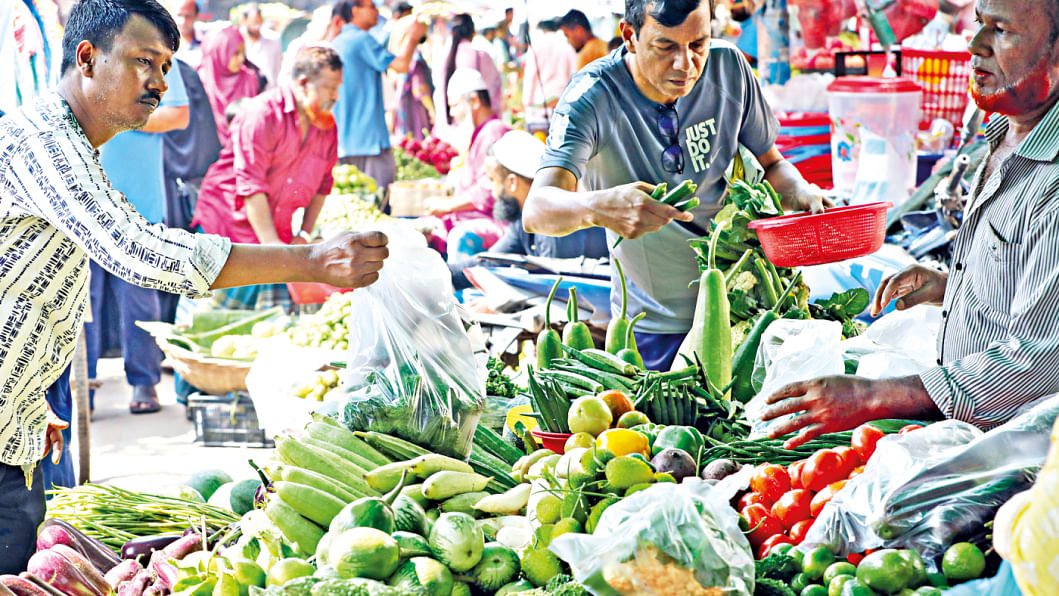Polythene ban: A litmus test for will and eco-innovation
Although Bangladesh became the first country in the world to announce a complete ban on the use of polythene bags in 2002, strict enforcement of the much-lauded initiative has only started taking shape recently.
In 2002, former environment minister Shajahan Siraj, a lawmaker of the-then ruling Bangladesh Nationalist Party, made the declaration on grounds that continuing the use of poly bags would pose severe risks to human health and the environment.
The move was initially accepted by most, leading to a steady decline in the pile up of associated plastic waste. However, this early momentum soon fizzled out as people started switching back to poly bags for a myriad of reasons.
These include the authorities' unwillingness to enforce the law as poly bag makers cried foul for their losses and lobbied political quarters to stay the order while the lack of acceptable alternatives was also scarce.
And with more than two decades having passed since then, the interim government decided that it would revive the ban and implement it in full from November 2024.
But roughly two and a half months on, the lone achievement to this end is that around 1,500 supershops across the country now offer jute, paper and cloth bags for shoppers to carry their purchases.
The use of poly bags is particularly rampant at local kitchen markets, indicating that Bangladesh is still struggling with the change despite being the globe's second largest producer of jute fibre, a widely accepted alternative.
WHY THOUGH?
Ironically, it is largely because there are not enough alternatives to plastic bags currently available.
Around 20 small-scale manufacturers of alternative bags are struggling to produce enough eco-friendly bags to meet the daily demand from supershops. No major investments have come in, nor are entrepreneurs showing interest in pouring money into alternative bag-making.
In wet kitchen markets, grocery shops and roadside stalls, there have been no visible changes in the use of poly bags before and after the ban took effect.
Factories in the narrow alleys of Lalbagh, Sahid Nagar and Chawkbazar -- roughly four kilometres from the government's executive headquarters at the Bangladesh Secretariat -- continue to produce poly bags of various shapes, sizes and colours, as they have for years.
According to small-scale eco-bag manufacturers, there is no guarantee that future political governments will continue to enforce the ban, let alone strengthen it.
This same uncertainty -- a stable policy environment -- deters small ventures from investing in eco bags.
Meanwhile, the government said traders decrying the lack of poly bag alternatives are, in fact, promoting the use of plastic bags.
According to environmentalists, implementation of the polythene ban faltered in 2002 because suitable alternatives were not available in adequate supply. So, it is essential to focus on developing alternatives that are both readily available and affordable to solve the polythene problem.

SUPERMARKETS ADAPTING TO CHANGE
Major supermarket chains, including Shwapno, Agora, Unimart, and Meena Bazar, swiftly adapted to the new regulations.
Jute and paper bags are now available at checkout counters while customers are being encouraged to bring their own reusable bags. Posters and announcements throughout the stores remind shoppers of the importance of reducing plastic consumption.
For those who forget their reusable bags, these stores offer eco-friendly alternatives priced between Tk 20 and Tk 25.
Sabbir Hasan Nasir, managing director of supershop Shwapno, sounded hopeful about phasing out poly bags.
"We welcome this initiative and have been encouraging customers to use eco-friendly bags instead of polythene," he said.
However, a major cause of concern is customer behaviour and their shopping habits.
Many shoppers are reluctant to buy reusable bags as they used to get poly bags for free whereas a typical jute bag often costs them around Tk 22. Besides, the jute bag itself can be a bother, especially for carrying heavy items like rice or wet foods like fish and meat.
Nasir said the government should come up with subsidies to make high-quality, durable eco-friendly bags that are more affordable for consumers.
He also highlighted the surging demand for jute bags, saying that Shwapno currently requires around 100,000 bags of different sizes daily. With the expansion of their outlets, this demand is increasing by 30 percent each month.

CAN ECO BAG PRODUCERS KEEP UP?
Md Rashedul Karim Munna, president of the Bangladesh Jute Diversified Products Manufacturers and Exporters Association, said the jute industry was not ready for the sudden increase in demand for affordable eco-friendly bags.
"Separate materials and investments are needed to produce such bags," he added.
Munna urged the government to issue a gazette ensuring the ban remains in effect for at least three years, arguing that this would encourage investment and create employment opportunities in the industry.
He also suggested lifting the value-added tax (VAT) on supermarket sales to make jute bags more accessible to both businesses and consumers.
Munna said the absence of financial incentives and supporting infrastructure for jute bag production is a major challenge for the long-term success of the ban.
Meanwhile, eco-friendly bag producers like Tahmidul Islam, owner of Baeki Centre, are already feeling the strain of keeping up with the sudden spike in demand.
Previously focused on making promotional items, Baeki Centre is now churning out biodegradable bags.
Since the enforcement of the ban, the company has been supplying more than 30,000 bags to various supermarkets every day.
However, Islam claimed the journey has been fraught with obstacles, like delayed payments from superstores.
"Some retailers are trying to clear bills many months after delivery. This makes it difficult to sustain production," he said.
Moreover, the rising price of raw jute and the unfortunate timing of the ban -- which coincided with the end of the jute harvesting season -- have made it nearly impossible to manufacture low-cost bags, he added.
Islam also expressed frustration over inadequate enforcement of the ban.
"Despite the government's directives, mobile courts are not being conducted regularly to ensure compliance," he said. "Without stricter oversight, the effectiveness of the ban could be seriously compromised."
SHOPPERS SLOW ON SWITCHING
Khandaker Nur-E-Burhan, chief operating officer of Agora Limited, said a massive public awareness campaign is necessary to educate consumers and businesses about the environmental benefits of reducing plastic use.
Unlike many other countries, the trend of shopping with reusable bags is not yet common practice in Bangladesh, he said.
Consumers are often hesitant to purchase reusable bags, which usually cost between Tk 15 and Tk 25, depending on quality and size.
"This added cost, plus the inconvenience of carrying bags to the market repeatedly, annoys many shoppers."
Burhan said low-cost, single-use eco-friendly bags, ideally priced between Tk 5 and Tk 7, were necessary.
However, he admitted that such affordable and high-quality options are currently unavailable.
Besides, the continued use of polythene bags in wet markets creates an uneven playing field for supermarkets. This disparity is impacting the profitability of businesses.
Against this backdrop, Burhan said he is in favour of the government implementing similar policies for both wet markets and superstores to ensure a level playing field for all businesses.
He also suggested providing financial assistance to eco-friendly bag makers to reduce production costs and make these alternatives more affordable for consumers.
KITCHEN MARKETS REMAIN PLASTIC BAN BATTLEGROUND
During a recent visit to a kitchen market in Uttara, an affluent neighbourhood of the capital Dhaka, a widespread reliance on plastic bags was found.
Grocers and vendors said customers rarely bring their own reusable bags, forcing them to provide plastic bags for carrying goods.
"There are eco-friendly bags available in the market," a vegetable vendor said. "But they are expensive, and customers are reluctant to buy those."
The shopkeepers all agreed that despite the government's ban on single-use plastic bags, there are no readily available alternatives that can offer the same convenience.
For instance, take the case of Asad Rahman who bought fish and vegetables from the kitchen market. He bought 1.5 kilogrammes of Rui fish and half a kilogramme of smaller fish, placing each type in separate plastic bags and then bundling them together in a larger one.
His shopping continued. Onions, green chillies and some vegetables were added to the growing basket, each in its separate poly bag. By the time he left the market, he was carrying a total of eight plastic bags.
"How is it possible to keep fish and meat in the fridge without polythene bags?" Rahman questioned. "And is there a viable alternative for transporting wet items from the market?"
Rahman informed that he is well aware of the dangers of non-biodegradable plastic bags, citing them as the main culprit for clogging drains and waterways, causing them to overflow even after a brief shower.
But when asked if he could have used fewer bags, his tone shifted.
"Plastic has become an integral part of our lives," he said. "It's incredibly convenient to use. So, the government must introduce a viable alternative before enforcing a complete ban."
Md Abdur Rouf, secretary of the Ministry of Textiles and Jute, also said he believes there is no alternative to using poly bags in absence of a proper substitute.
But while informing that the ministry does not have any dedicated research wing for developing potential alternatives to poly bags, he admitted that biodegradable cloth and jute bags could serve this purpose for now.
Regarding the extra cost to consumers, he said they have no choice but to accept it as there is little scope to provide eco-friendly bags free of cost.

'NO ALTERNATIVE IS NO EXCUSE'
Farhina Ahmed, secretary at the Ministry of Environment, Forest and Climate Change, dismissed claims that a lack of alternatives is the main obstacle to phasing out polythene bags.
"Traditionally, Bangladesh has always had alternatives to plastic," she said. "It doesn't have to be jute as cotton and paper bags are also viable options."
According to her, the process must be simultaneous: consistent monitoring and enforcement alongside a search for alternatives.
"The government is implementing the ban in phases," she said. "While using plastic bags has become deeply ingrained in our daily lives, perceived as safe, convenient, and free -- which it is not -- this shift will take time. If you currently require 10 million plastic bags per day, you would need significantly fewer reusable alternatives."
Ahmed also said the country has no choice but to transition to alternatives, not only because it is the law, but because the continued use of plastic will irrevocably damage peoples' health and the environment.
"If Chennai, Rwanda and Tanzania can successfully implement a plastic ban, then there is no reason why Bangladesh cannot do the same," she added.

 For all latest news, follow The Daily Star's Google News channel.
For all latest news, follow The Daily Star's Google News channel. 





Comments